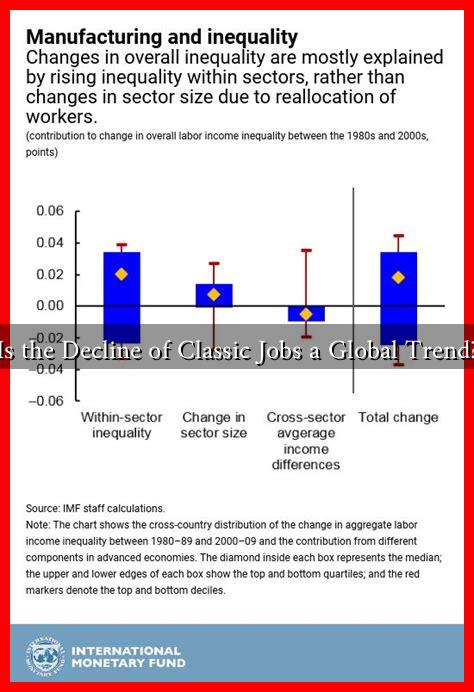-
Table of Contents
Is the Decline of Classic Jobs a Global Trend?
In recent years, the job market has undergone significant transformations, leading many to question whether the decline of classic jobs is a global trend. Classic jobs, often characterized by stable employment in sectors such as manufacturing, retail, and traditional office roles, are increasingly being replaced by gig work, automation, and remote opportunities. This article explores the factors contributing to this decline, examines its global implications, and highlights the emerging trends reshaping the workforce.
The Changing Landscape of Employment
The traditional employment model, which typically involved long-term contracts and predictable work hours, is being challenged by various forces. Key factors driving this change include:
- Technological Advancements: Automation and artificial intelligence (AI) are revolutionizing industries, leading to the replacement of routine jobs. For instance, a report by McKinsey Global Institute estimates that up to 800 million jobs could be displaced by automation by 2030.
- Globalization: The interconnectedness of economies has led to outsourcing and offshoring, reducing the number of classic jobs in developed countries while creating new opportunities in emerging markets.
- Changing Workforce Preferences: Younger generations prioritize flexibility and work-life balance, leading to a rise in gig and freelance work. According to a study by Upwork, 36% of the U.S. workforce is now freelancing.
Case Studies: A Global Perspective
To understand the decline of classic jobs, it is essential to examine specific case studies from different regions:
United States
In the U.S., the decline of manufacturing jobs has been particularly pronounced. Once a cornerstone of the American economy, manufacturing employment has decreased from 30% in the 1950s to about 8% today. This shift has been attributed to automation and the relocation of factories to countries with lower labor costs. The rise of e-commerce has also transformed retail, with traditional stores struggling to compete with online giants like Amazon.
Europe
In Europe, countries like Germany and the UK have seen similar trends. The rise of the gig economy has led to a significant increase in temporary and part-time work. According to Eurofound, around 10% of the EU workforce is engaged in non-standard forms of employment, which often lack the benefits associated with classic jobs.
Asia
In Asia, particularly in countries like India and China, the shift towards technology-driven jobs is evident. The IT sector has flourished, while traditional manufacturing jobs are declining. A report by the World Economic Forum indicates that by 2025, 85 million jobs may be displaced by a shift in labor between humans and machines, particularly in developing economies.
The Impact of the Decline of Classic Jobs
The decline of classic jobs has far-reaching implications for economies and societies worldwide:
- Economic Inequality: As traditional jobs disappear, workers may struggle to find new opportunities, leading to increased economic disparity.
- Job Security: The rise of gig work often comes with a lack of job security and benefits, leaving many workers vulnerable.
- Skill Gaps: The demand for new skills in technology and digital literacy is growing, creating a gap for those unable to adapt.
Conclusion: Navigating the Future of Work
The decline of classic jobs is indeed a global trend influenced by technological advancements, globalization, and changing workforce preferences. While this shift presents challenges, it also offers opportunities for innovation and growth in new sectors. As economies adapt, it is crucial for policymakers, businesses, and educational institutions to collaborate in preparing the workforce for the future. Emphasizing skill development and creating safety nets for workers can help mitigate the adverse effects of this transition.
In summary, the landscape of employment is evolving, and understanding these changes is essential for navigating the future of work. For further insights on the future of jobs and the impact of technology, you can explore resources from the World Economic Forum.

